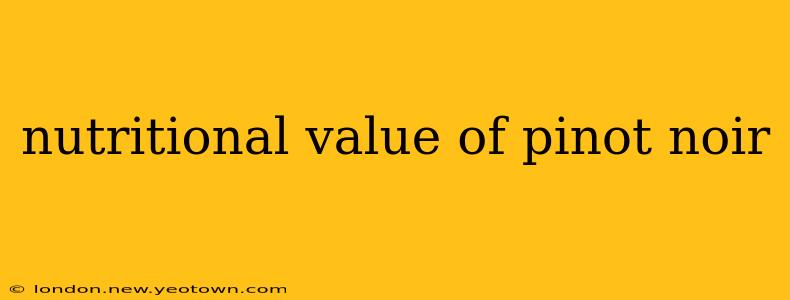Uncorking the Nutritional Value of Pinot Noir: More Than Just a Delicious Drink
Pinot Noir. The name conjures images of sun-drenched vineyards, elegant glasses, and sophisticated evenings. But beyond its alluring aroma and smooth taste, this beloved red wine offers a surprising array of health benefits, thanks to its unique nutritional profile. Let's delve into the world of Pinot Noir and uncover its hidden nutritional treasures.
It's important to remember that while Pinot Noir boasts several potential health advantages, moderation is key. Excessive alcohol consumption can have serious negative health consequences. This exploration focuses on the potential benefits within the context of responsible drinking.
What are the key nutritional components of Pinot Noir?
Pinot Noir, like other red wines, is a complex beverage with a range of compounds contributing to its nutritional value. These include:
-
Resveratrol: This powerful antioxidant is often cited as one of the key health benefits of red wine, particularly Pinot Noir. Found in the skin of the grapes, resveratrol is linked to potential cardiovascular protection and anti-aging properties. However, the amount of resveratrol varies significantly depending on the growing conditions and winemaking process.
-
Polyphenols: Pinot Noir is rich in polyphenols, another category of antioxidants that contribute to the wine's vibrant color and protect against cell damage. These compounds are associated with reducing the risk of chronic diseases.
-
Minerals: While the mineral content is relatively low, Pinot Noir does contribute small amounts of potassium, magnesium, and other trace minerals.
-
Vitamins: Similar to minerals, the vitamin content is minimal. You won't find significant amounts of vitamins in a glass of Pinot Noir.
Does Pinot Noir have any health benefits?
The potential health benefits of Pinot Noir, largely attributed to its antioxidant content, are a topic of ongoing research. Studies suggest possible links to:
-
Heart Health: The resveratrol and polyphenols in Pinot Noir may contribute to improved cardiovascular health by reducing blood pressure, improving cholesterol levels, and reducing the risk of blood clot formation. However, it's crucial to remember that these are potential benefits, and further research is needed.
-
Brain Health: Some studies suggest that the antioxidants in Pinot Noir might offer neuroprotective effects, potentially reducing the risk of age-related cognitive decline. Again, more research is required to solidify these findings.
-
Cancer Prevention: The antioxidant properties of Pinot Noir have been linked to potential anticancer effects in some studies. However, it’s essential to understand that red wine is not a cure for cancer, and a balanced diet and lifestyle are far more crucial in cancer prevention.
How many calories are in a glass of Pinot Noir?
A typical 5-ounce glass of Pinot Noir contains approximately 125 calories. However, calorie counts can vary slightly depending on the specific wine and its alcohol content. It's always a good idea to check the nutrition label if available.
Is Pinot Noir good for weight loss?
Pinot Noir itself isn't a weight-loss miracle. The calories in alcohol can contribute to weight gain if consumed in excess. However, moderate consumption as part of a balanced diet and active lifestyle is unlikely to hinder weight loss efforts. Focusing on a healthy diet and regular exercise remains crucial for weight management.
What are the potential downsides of drinking Pinot Noir?
While moderate consumption might offer potential health benefits, excessive alcohol intake can lead to various health problems, including:
- Liver damage
- Increased risk of certain cancers
- Weight gain
- High blood pressure
- Dependence
In conclusion, Pinot Noir, enjoyed responsibly, can be part of a healthy and balanced lifestyle. Its nutritional profile, particularly its antioxidant content, suggests potential health benefits. However, always remember that moderation is key, and a healthy diet and lifestyle are far more impactful than any single food or beverage. Consult with a healthcare professional or registered dietitian for personalized advice on alcohol consumption.

